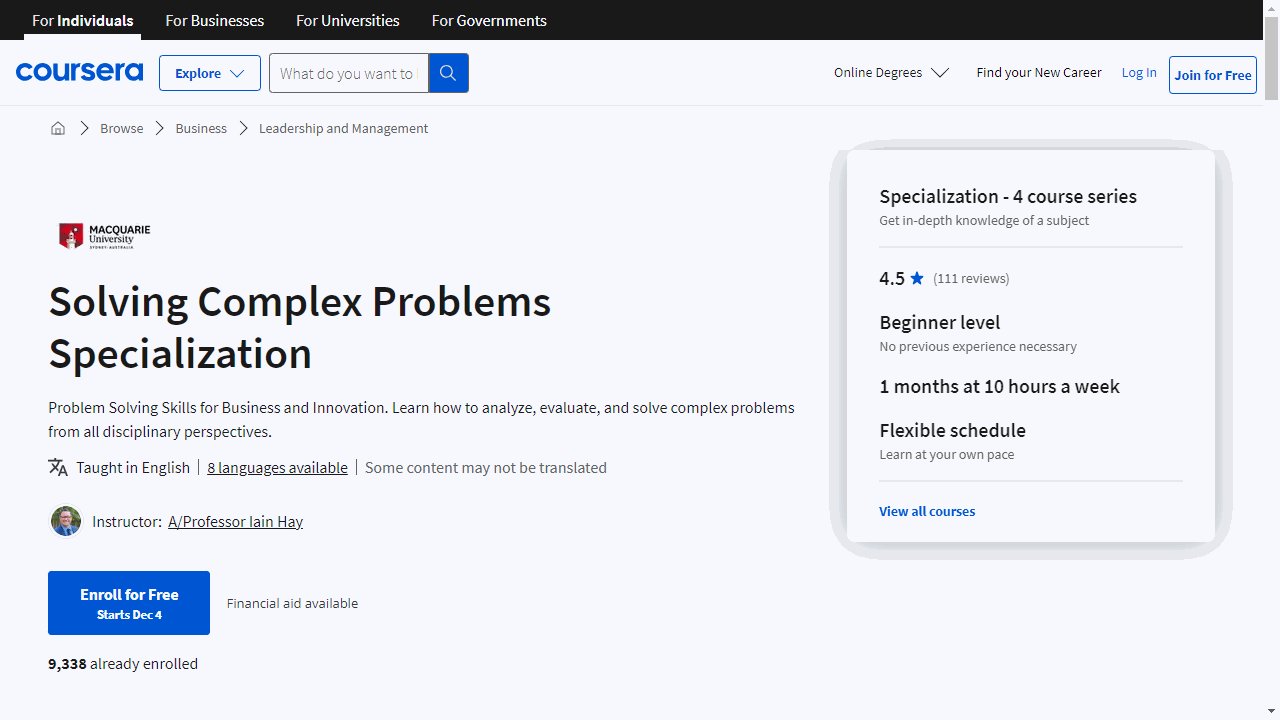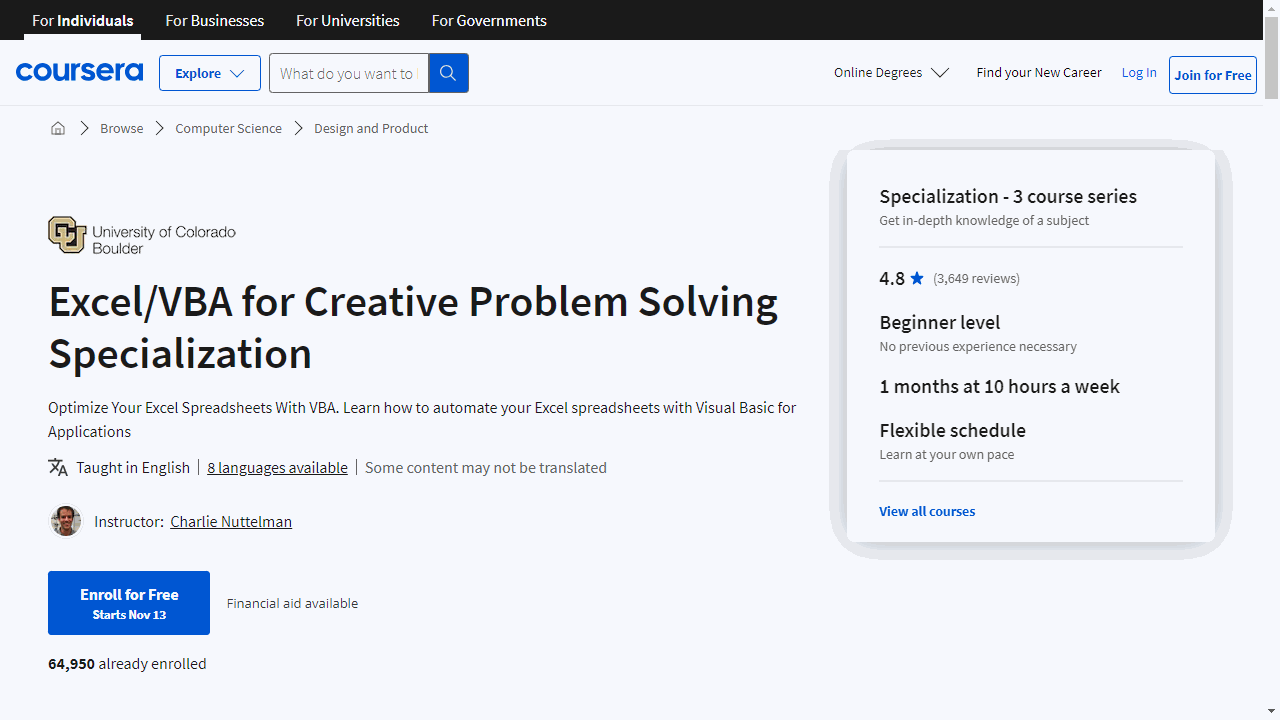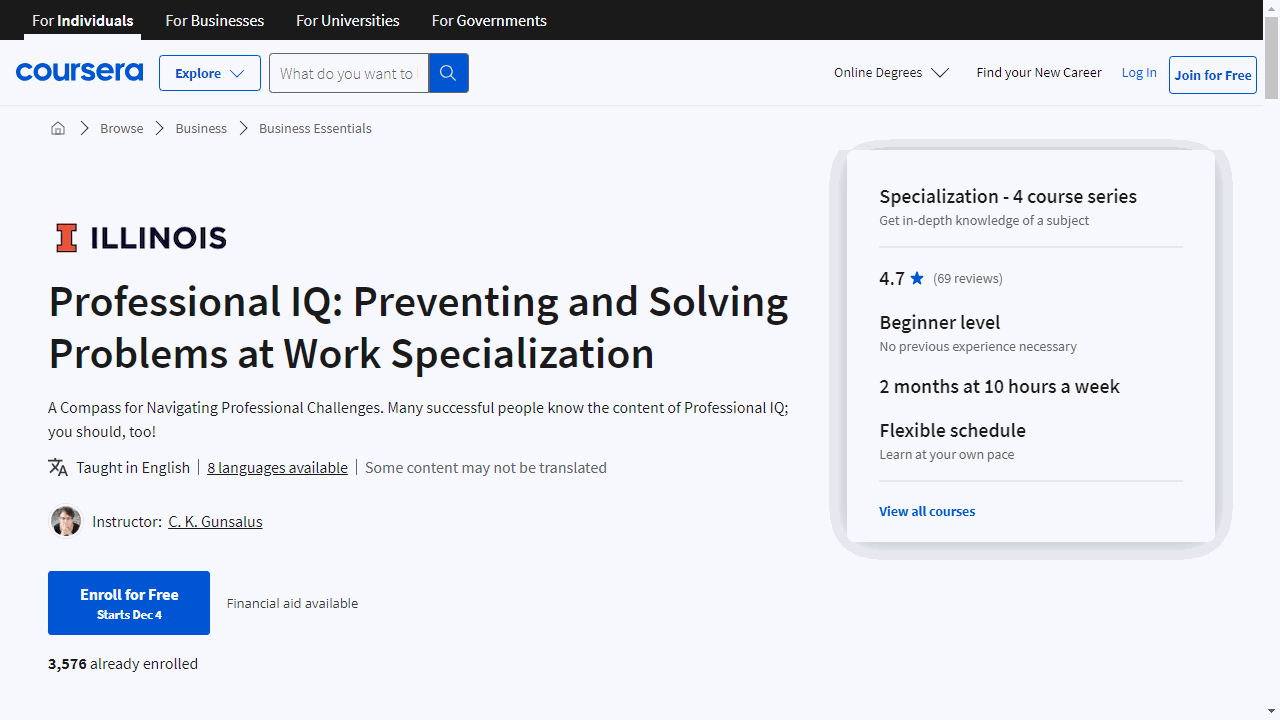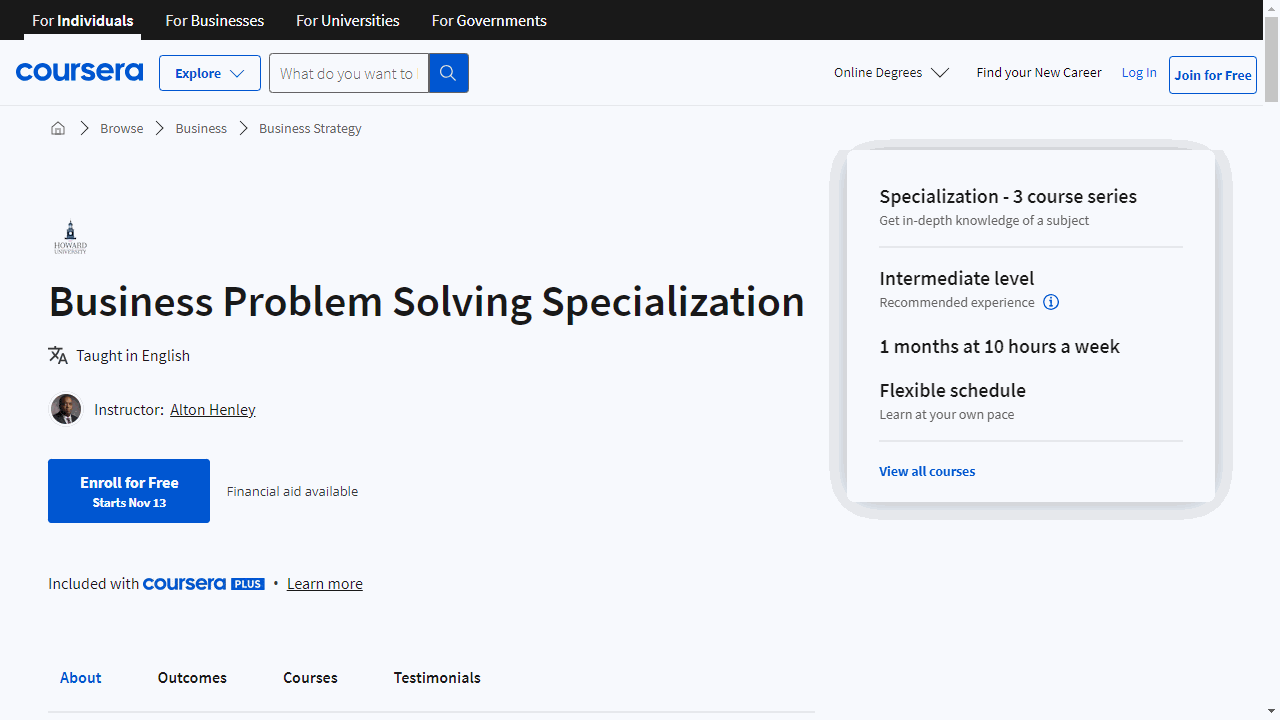Problem-solving is a fundamental skill that transcends industries and disciplines.
Whether you’re a student, a professional, or simply someone looking to improve your ability to navigate challenges, honing your problem-solving skills can unlock new opportunities and lead to greater success in all aspects of life.
By developing a structured approach to problem-solving, you can learn to identify the root causes of issues, generate creative solutions, and implement effective strategies to overcome obstacles and achieve your goals.
Finding the right course to guide you on this journey can be challenging, with numerous options available online.
You’re seeking a course that not only provides a theoretical understanding of problem-solving frameworks but also equips you with practical tools and techniques that you can apply to real-world situations.
For the best problem-solving course overall, we recommend Solving Complex Problems Specialization offered by Macquarie University on Coursera.
This specialization delves deep into the intricacies of complex problems, exploring their common patterns across various systems and equipping you with the skills to analyze, evaluate, and create innovative solutions.
The capstone project allows you to apply your learning to a real-world problem, solidifying your understanding and building a portfolio-worthy demonstration of your abilities.
While Solving Complex Problems Specialization is our top pick, there are other excellent courses available that cater to specific needs and learning styles.
Whether you’re interested in a consulting approach, leveraging Excel and VBA, or incorporating emotional intelligence into your decision-making process, we’ve got you covered.
Keep reading to explore our curated list of the best problem-solving courses and discover the perfect fit for your learning journey.
Solving Complex Problems Specialization
Provider: Coursera
The Solving Complex Problems Specialization, offered by Macquarie University, equips you with the skills to tackle intricate challenges across various fields.
You’ll begin with “Analysing Complexity,” exploring common patterns in complex problems across physical, biological, and human systems, including those of the Anthropocene—our current age defined by human impact.
Next, “Evaluating Problems” delves into the human approach to problem-solving.
You’ll learn about cognitive biases, the history of problem-solving, and how different disciplines, including philosophy, science, and the humanities, approach challenges.
Statistical analysis for critical thinking is also covered.
“Creating Innovation” explores generating solutions.
You’ll examine the core principles of innovation, its historical evolution, and how it emerges from networks.
You’ll discover how organizations foster innovation and the factors influencing innovation within markets.
The course also highlights how innovation is crucial for addressing 21st-century challenges.
Finally, the “Solving Complex Problems Capstone” lets you apply your learned skills to a real-world problem of your choosing.
You’ll create a comprehensive briefing paper analyzing, evaluating, and proposing solutions for this problem.
This practical experience solidifies your problem-solving abilities and deepens your understanding of your chosen field.
Consulting Approach to Problem Solving
Provider: Udemy
This Udemy course, “Consulting Approach to Problem Solving,” teaches you how to solve problems like a top consultant from firms like McKinsey, BCG, and Bain.
You’ll discover how these firms use structured problem-solving to tackle tough business challenges.
The course starts by introducing you to Hypothesis-Based Problem Solving (HBPS).
You’ll learn how to use this step-by-step framework to solve problems effectively.
You’ll then dive into problem structuring, learning how to break down complex business problems using frameworks like Porter’s 5 Forces and the BCG Matrix.
You’ll learn how to create mind maps and issue trees, which help you visualize and organize your thoughts.
This process uses the MECE principle (Mutually Exclusive and Cumulatively Exhaustive) to ensure you’re considering all relevant aspects of the problem.
The course doesn’t stop there.
You’ll also learn how to write effective problem statements using the SMART approach, prioritize your work based on value, and use data to test your solutions.
Finally, you’ll discover how to use storytelling and storyboarding to present your findings in a clear and persuasive way, just like a consultant.
You’ll even learn common consulting jargon so you can talk the talk.
Excel/VBA for Creative Problem Solving Specialization
Provider: Coursera
This specialization equips you with the power of Visual Basic for Applications (VBA) to automate tasks, making you a more efficient problem-solver with spreadsheets.
The specialization unfolds in three parts.
Part 1 introduces you to VBA, teaching you how to create time-saving macros, define custom functions tailored to your needs, and build interactive subroutines.
You’ll also master Excel’s Goal Seek and Solver tools, powerful allies in tackling optimization problems.
Part 2 delves deeper, guiding you to work with arrays, import and export data seamlessly using VBA code, and become proficient in manipulating text strings.
You’ll even learn how to consolidate information from multiple worksheets or workbooks, centralizing your data effortlessly.
This part culminates in building professional-looking user forms, adding interactivity and advanced calculations to your spreadsheets.
Part 3 challenges you to apply your newfound skills to real-world problems by creating VBA user forms, providing practical experience and feedback from fellow learners.
This hands-on specialization, through its in-application assignments, gives you direct experience with the skills learned, making you a more confident and efficient problem solver using Excel and VBA.
Lean Problem-Solving for Team Members and Leaders
Provider: Udemy
This course teaches you effective problem-solving using various models, including the PDCA (Plan-Do-Check-Act) model and the A3 model.
You learn the principles of lean manufacturing, crucial for continuous improvement, and brainstorming skills essential for teamwork.
You’ll dive into techniques like the Five Why’s, a simple yet powerful method for uncovering the root cause of any problem.
You’ll master the widely-used PDCA model, developed by Walter Schewart and championed by quality gurus like Dr. W. Edwards Deming and Dr. Juran.
The course breaks down how companies like Toyota use the PDCA model for business improvement, guiding you through each of its four phases: Plan, Do, Check, and Act.
You’ll learn to use brainstorming methods like Fishbone and Affinity Diagrams to generate creative solutions as a team.
The course also teaches you Pareto Analysis, a technique for identifying and prioritizing the most significant problems.
You’ll explore the A3 model, a philosophy that blends problem-solving with continuous learning and improvement.
The course guides you step-by-step through the A3 process, ensuring you ask the right questions in the right order to arrive at effective solutions.
Professional IQ: Preventing and Solving Problems at Work Specialization
Provider: Coursera
This specialization gives you a strong foundation for facing professional challenges head-on.
It all starts with “Foundations of Professional Identity.”
This course teaches you how to spot and handle ethical dilemmas that pop up at work, like dealing with pressure to compromise your values or witnessing unethical behavior.
You learn to make decisions based on a strong ethical framework.
Next, “Shaping Your Professional Brand” helps you build positive relationships with colleagues.
You discover how to listen actively, recognize biases that might cloud your judgment, and handle difficult conversations constructively.
Then, “Leadership and Influence” teaches you how to become a leader who creates positive change.
You work on your negotiation skills, learn how to resolve conflicts peacefully, and discover how to create a work environment that reflects your values.
Finally, you get to put it all together in the “Professional IQ Capstone.”
You design your own leadership credo based on your values and develop a plan for your professional growth.
Decision Making: Solve Problems with Emotional Intelligence
Provider: Udemy
This course teaches you practical techniques to make smarter decisions and navigate challenges effectively.
You’ll discover the four distinct decision-making styles: directive, behavioral, conceptual, and analytical, helping you understand your own approach and its strengths and weaknesses.
The course delves into the crucial link between emotional intelligence and decision-making, revealing how emotions can influence your choices - both positively and negatively.
This course unpacks “reality testing,” a core component of emotional intelligence.
You’ll learn to separate subjective perceptions from objective realities, recognizing how your beliefs, past experiences, and even your “three brains”—head, heart, and gut—impact your view of the world.
This deeper understanding empowers you to make more objective and informed decisions.
You’ll learn to identify different types of problems and apply a range of problem-solving techniques, including the SCAMPER technique.
SCAMPER helps you brainstorm creative solutions by prompting you to Substitute, Combine, Adapt, Modify, Put to another use, Eliminate, or Reverse elements of a problem.
Have you ever made a decision in the heat of the moment and later regretted it?
This course explores the often-overlooked skill of impulse control.
You’ll learn how willpower and the amygdala, the emotional center of your brain, play a role in impulsive behavior.
You’ll discover practical strategies to strengthen your impulse control, especially in our technology-driven world, leading to more thoughtful and reasoned decision-making.
Finally, the course introduces mindfulness as a powerful tool for better decision-making.
You’ll delve into the neuroscience behind mindfulness and experience its benefits through guided exercises.
You’ll learn how practicing mindfulness can reduce stress, improve focus, and help you regulate your emotions, leading to calmer and more rational decision-making, even in challenging situations.
Business Problem Solving Specialization
Provider: Coursera
The Business Problem Solving Specialization on Coursera is a great way to learn how to use data to solve business problems.
You will learn how to use Microsoft Excel to build models and analyze data.
In the first course, “Fundamentals of Business Problem Solving,” you will learn how to use Solver, a powerful tool in Excel that helps you find the best solutions to problems.
You will also learn how to identify opportunities and risks in business processes.
“Business Modeling Tools,” the second course, teaches you how to use single and multiple regression to analyze data and make predictions.
You will also learn how to build business cases and develop strategies based on your findings.
This course gives you a deeper understanding of Data Analysis and helps you make better decisions based on data.
Finally, you will put your skills to the test in “Solving Business Problems with Spreadsheet Modeling.”
This course challenges you to solve a real-world business problem using what you have learned.
You will use advanced data analysis tools, including Correlation Analysis and Sensitivity Analysis.
These tools help you understand the relationships between different factors and how changes can impact your results.
Master Strategic Thinking and Problem Solving Skills
Provider: Udemy
This Udemy course on strategic thinking and problem-solving skills equips you with a versatile toolkit to tackle challenges head-on.
You’ll delve into the “IDEAL” model, a step-by-step method that helps you define problems, gather information, explore solutions, and implement the best course of action.
The course emphasizes “Double Loop Learning,” a valuable skill that empowers you to analyze and address the root causes of recurring problems.
You’ll master practical decision-making models, including the “Eisenhower Matrix” for prioritizing tasks and the “Crossroads Model” for making informed long-term decisions.
The course also explores the “Randomize and Sort” method, which helps you make unbiased choices when faced with difficult alternatives.
Beyond decision-making, you’ll develop essential skills in conflict resolution, such as the “Integration Model” for finding win-win solutions.
By understanding “Maslow’s Hierarchy of Needs,” you’ll learn to navigate conflicts by addressing the underlying needs and desires of those involved.
The course provides a solid foundation in strategic thinking, covering techniques like “SWOT Analysis” for assessing strengths, weaknesses, opportunities, and threats, and “Design Thinking” for fostering innovation.
Also check our posts on:








